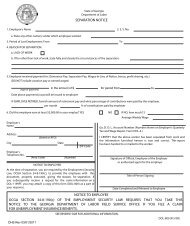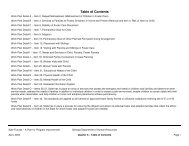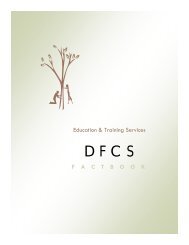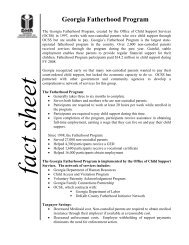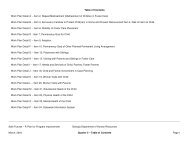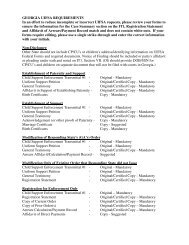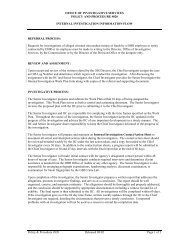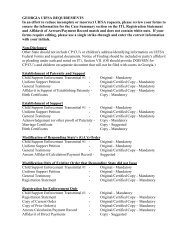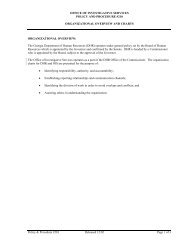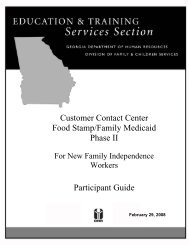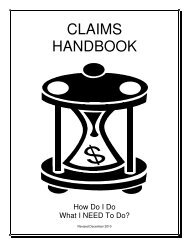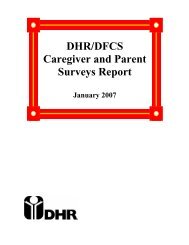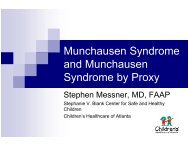an overview georgia program improvement plan - Department of ...
an overview georgia program improvement plan - Department of ...
an overview georgia program improvement plan - Department of ...
Create successful ePaper yourself
Turn your PDF publications into a flip-book with our unique Google optimized e-Paper software.
loss/trauma reactions. Content included strategies for m<strong>an</strong>aging disruptive behaviors before attachments are formed <strong>an</strong>d m<strong>an</strong>aging challenging<br />
behaviors connected with parent visits with children in care.<br />
• Strength-based Assessment: Part One & Two– Family Assessment Skills – E. Douglas Pratt, D.S.W., LMSW. Georgia has been developing a<br />
model <strong>of</strong> family-centered practice for over five years. This model enh<strong>an</strong>ces systems <strong>of</strong> care <strong>an</strong>d individualized multi-agency family support networks.<br />
While most child <strong>an</strong>d family practitioners in Georgia have practical knowledge about controlling risks, effective practitioners share common skill-sets<br />
for assessment <strong>an</strong>d pl<strong>an</strong>ning that actively involve family <strong>an</strong>d other supports in ways that leave more families safely in charge <strong>of</strong> their own teams. This<br />
two-part workshop provided particip<strong>an</strong>ts with concrete skills <strong>an</strong>d strategies to improve their assessment so they might more positively impact family<br />
outcomes <strong>an</strong>d skills in family centered assessment <strong>an</strong>d the development <strong>of</strong> service pl<strong>an</strong>s responsive to individual <strong>an</strong>d family needs.<br />
• Subst<strong>an</strong>ce Abuse: Reading the Signs, Recognizing the Symptoms, delivered by Karen Terry, NCAC <strong>an</strong>d C<strong>an</strong>dee Winfield, LPC. Particip<strong>an</strong>ts were<br />
able to identify the relational dynamics present within the family <strong>of</strong> <strong>an</strong> addicted person. Content included discussion <strong>of</strong> the disease concept <strong>of</strong> addiction,<br />
identification <strong>of</strong> the symptoms associated with a diagnosis <strong>of</strong> chemical dependency <strong>an</strong>d components <strong>of</strong> the alcohol <strong>an</strong>d drug assessment instrument <strong>an</strong>d<br />
process.<br />
• When Mental Health Issues Impair Parental <strong>an</strong>d Family Functioning, delivered by Judy Plecko, Licensed Clinical Social Worker. This workshop<br />
was designed to focus on the impact <strong>of</strong> mental illness on parenting capacity <strong>an</strong>d to present tools <strong>an</strong>d interventions to restore bal<strong>an</strong>ce to the family<br />
system. Particip<strong>an</strong>ts learned how to identify issues <strong>an</strong>d challenges for children when a parent has a mental illness, how to recognize specific mental<br />
health disorders, (their risks <strong>an</strong>d potential severity) <strong>an</strong>d learned effective interventions for helping parents <strong>an</strong>d children cope with the effect <strong>of</strong> mental<br />
illness on the family system.<br />
Items 42. The st<strong>an</strong>dards are applied to all licensed or approved foster family homes or childcare institutions receiving title IV-E or IV-B funds.<br />
Because the st<strong>an</strong>dards for family foster homes licensure in the state’s public <strong>an</strong>d private sectors are different, primary components <strong>of</strong> the state’s pl<strong>an</strong> to bring uniformity included:<br />
1) researching procedures used by other states to bring public <strong>an</strong>d private agencies under common licensure; 2) Recommend DFCS policy regarding waivers for minimum<br />
st<strong>an</strong>dards requirements for foster homes facing unusual situations <strong>an</strong>d 3) recommend additional policy ch<strong>an</strong>ges, if needed. The work group determined that waivers are gr<strong>an</strong>ted<br />
regarding required st<strong>an</strong>dards for both public <strong>an</strong>d private agency foster homes. No waivers are allowed for st<strong>an</strong>dards established by local or state governing bodies or established<br />
safety <strong>an</strong>d health codes.<br />
Item 44. State has in place a process for ensuring the diligent recruitment <strong>of</strong> potential foster <strong>an</strong>d adoptive families that reflect the racial <strong>an</strong>d cultural diversity <strong>of</strong><br />
children in the state for whom foster <strong>an</strong>d adoptive homes are needed.<br />
Safe Futures – A Pl<strong>an</strong> for Program Improvement<br />
Georgia <strong>Department</strong> <strong>of</strong> Hum<strong>an</strong> Resources<br />
November, 2004 Quarter 8 – Table <strong>of</strong> Contents Page xxii



